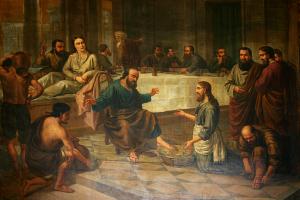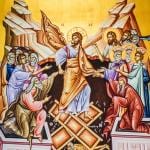
On Holy Thursday, Pope Francis, following the tradition established by his predecessors, practices an act of love and charity as he engages the rite of foot washing. He humbly chooses people, such as criminals, whom others would normally disregard and treat as worthless, and lifts them up by cleaning their feet. He embraces those who need love, showing them that whatever they have done, whatever path their life has taken them, God still loves them. Likewise, he shows us that they still possesses human dignity of their own which we should respect and cherish.
Sadly, when the Pope does this, those who seek to criticize him find this as a good excuse to do so. They think he should not treat outcasts with such grace. It is clear, they do not want to listen to the Pope and learn what he is teaching because if they did, they would have to accept that their legalistic interpretation of the faith is dead. For their objections to Francis stem from their attempt to reify a deadened faith, a faith which knows no love. Likewise, though they try to suggest such acts go against tradition, all they show is that they do not know tradition. This is not only because tradition is living, capable of development over time, but also because tradition itself exists in a plurality of forms. They want to limit tradition to one form, to make sure people end up just as dead as they are.
Pope Francis follows the spirit of the desert fathers. They knew the way of faith was the way of community, the way of charity, that is, the way of love. Abba John the Persian, for example, suggested that he had faith that God would welcome him into the kingdom of God because God’s grace had given him the ability to follow the examples of charity he learned from those who came before him:
Someone said to Abba John the Persian, ‘We have borne great afflictions for the sake of the kingdom of heaven. Shall we inherit it?’ The old man said, ‘As for me, I am confident I shall obtain the inheritance of Jerusalem on high, which is written in the heavens. Why should I not be confident? I have been hospitable like Abraham, meek like Moses, holy like Aaron, patient like Job, humble like David, a hermit like John, filled with compunction like Jeremiah, a master like Paul, full of faith like Peter, wise like Solomon. Like the thief, I trust that he who of his natural goodness has given me all that, will also grant me the kingdom.’[1]
Abba John the Persian especially imitated the hospitality of Abraham. He welcomed those who came to him, willing to bless them, no matter who they were, nor what they had done before coming to him. Thus, he also took to feet washing as a way of sharing his blessings upon others:
It was said of Abba John the Persian that when some evildoers came to him, he took a basin and wanted to wash their feet. But they were filled with confusion, and began to do penance.[2]
John’s charity, John’s willingness to serve the evildoers, had a profound effect on them. Whatever evil they had done was undermined by John as he washed their feet. They embraced the love which he showed to them, so that what he did left them cleansed, not only on their feet, but in their souls. That is, they changed their ways, and did penance so that their natural goodness, which had been covered up by the filth of their sin, could once again be revealed. Like everyone else, they had been made in the image and likeness of God. John worked with them, showed them his love, showed them that despite what they had done, they would not be abandoned by God. Through service, he did what he could to encourage them to let the image of God contained within them to once again be revealed. He knew it was there. His love for them stemmed from it. It was also the kind of love which Abraham excelled, and through that love, through his hospitality, Abraham was able to encounter God in those who came to visit him. This is why at Mamre, Abraham was given a special revelation, where he realized, at least in part, the Trinitarian nature of God.
Pope Francis, therefore, shows us the greater tradition, the way foot washing can be and should be used as a way of bringing out the image of God in others. This should not be surprising, as foot washing was understood to represent the cleansing of sin found in confession and penance. God can come to us in the routine of our life and cleanse us of our post-baptismal sins. Abba John’s embrace of foot washing seems to suggest he understood this. Whether or not those Pope Francis embraces will follow through with the love he showed them, we do not know; nonetheless, it is clear, his embrace of them gives them the opportunity to realize their inherent dignity, a dignity which is theirs because they are made in the image and likeness of God. The love which they were shown can work for their reformation, as it is such love which has helped place many people onto the path of righteousness.
[1] The Sayings of the Desert Fathers. trans. Benedicta Ward (Kalamazoo, MI: Cistercian Publications, 1984), 108 [Saying of John the Persian #4].
[2] The Sayings of the Desert Fathers, 108 [Saying of John the Persian #3].
Stay in touch! Like A Little Bit of Nothing on Facebook.
If you liked what you read, please consider sharing it with your friends and family!













